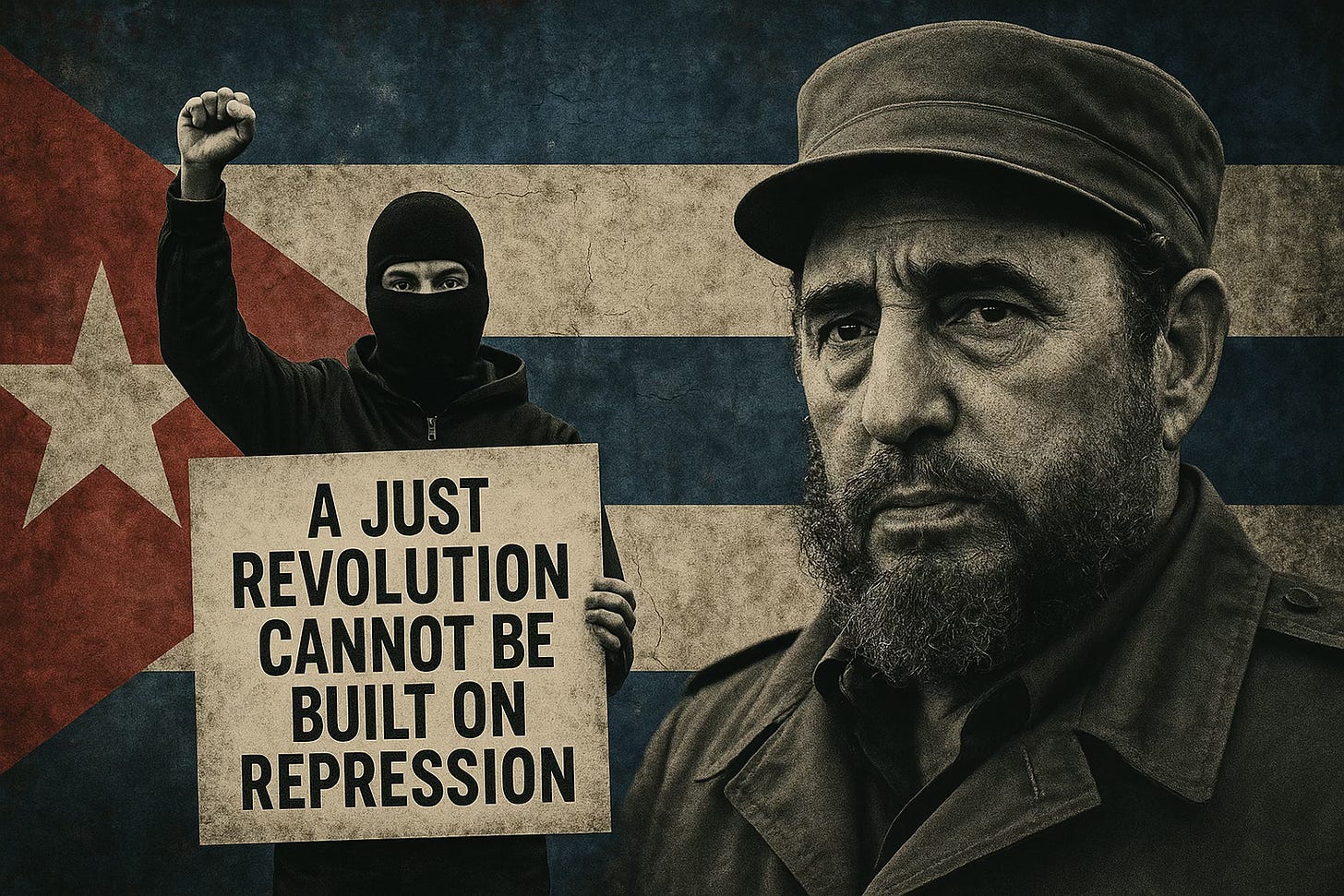Fidel Castro’s Cuba: Revolution, Repression, and the High Cost of Silence
By Rafael Benavente
Fidel Castro’s Cuba: Revolution, Repression, and the High Cost of Silence
For nearly half a century, Fidel Castro ruled Cuba under the banner of revolution, promising a society of justice, equality, and dignity. Yet behind the slogans and state propaganda lay a system of repression, fear, and control that devastated generations of Cubans.
The Rise of the Revolution
On January 1, 1959, Fidel Castro and his revolutionary forces entered Havana, signaling the end of Fulgencio Batista’s dictatorship and the birth of a new political era. The revolution, born in the Sierra Maestra with rifles and radical speeches, promised liberation from imperialism, poverty, and corruption. It vowed to bring free education, healthcare for all, food security, and an end to social inequality.
But Cuba’s utopia quickly turned into a dystopia.
From Dreams to Dictatorship
Castro’s regime swiftly centralized power. Private property was abolished, the economy nationalized, and dissent criminalized. Inspired by communist doctrine, Cuba under Castro rejected capitalist models in favor of a planned, state-controlled society. While the promises were lofty, the outcomes were chilling.
Cuba became a country where:
Freedom of expression was outlawed
Journalists, artists, and religious leaders were silenced or exiled
Homosexuals were persecuted
Political dissent was equated to treason
Moral Purges and the UMAP Camps
Perhaps the most sinister chapter of the regime’s repression was its campaign against those it deemed morally deviant. In the 1960s and 70s, Cuba witnessed what were termed “moral purges,” aimed at homosexuals, intellectuals, and those who didn’t conform to revolutionary ideals.
The UMAP (Unidades Militares de Ayuda a la Producción) camps became infamous. These forced labor camps masqueraded as “rehabilitation centers” for anyone considered a threat to the state’s moral and ideological purity—gays, Jehovah’s Witnesses, political dissenters, and others.
Individuals were forcibly removed without trial.
Prisoners endured hard labor, physical abuse, and psychological torture.
The regime’s slogan: “Work will make you men” echoed the chilling words etched into the gates of Auschwitz: “Work will set you free.”
Homophobia as State Policy
Castro’s government institutionalized homophobia. Gays were labeled as "degenerates" and "parasites" unfit for society. They were expelled from schools and professions, shunned, and often imprisoned or sent to the UMAP camps.
In an extraordinary form of protest, some young Cubans deliberately infected themselves with HIV as a way to escape military service and state control. These acts of desperation were cries for freedom in a country where even love could be a crime.
Economic Collapse and Daily Struggle
Castro’s economic policies turned Cuba from a thriving exporter of sugar and tobacco into a nation dependent on food imports. Ration books became a staple of every household, offering only minimal sustenance. The collapse of the Soviet Union and later Venezuela’s decline plunged Cuba into chronic shortages.
Cubans endured:
Endless food lines
Decades of blackouts
A barter economy beneath the radar of the state
Chronic malnutrition and medical supply shortages
And yet, the regime proclaimed Cuba a "medical power" and "paradise of the poor" while millions starved or fled.
The Veil of Propaganda
Censorship was the regime’s spine. All media, literature, film, and art were tools of the Communist Party. No independent press. No free thought. Only the voice of Castro.
Tourism became a façade. Foreigners saw luxury hotels and restored colonial plazas, but not the crumbling buildings where Cubans lived without running water or reliable electricity.
The worst censorship, however, was reserved for reality itself.
Numbers That Speak Volumes
The human cost of Castro’s revolution is staggering:
Over 7,000 executed
20,000 political prisoners
2.5 million Cubans forced into exile
The tragedy reached its apex during the 1994 “13 de Marzo” tugboat massacre, when 41 people—including children—died as Cuban security forces sank a vessel trying to escape the island.
In 2003, three young men were executed by firing squad for attempting to hijack a ferry to Miami. They had no weapons, no hostages, and had harmed no one. Their crime: wanting freedom.
Castro’s Dual Legacy
To some abroad, Castro became a symbol of anti-imperialism and socialist defiance. His image adorned posters and T-shirts from Latin America to Europe.
But to most Cubans, he was the face of tyranny. A man who turned a revolution into a regime of surveillance, hunger, and pain. A dictator who denied generations their voice, their dreams, and in too many cases, their lives.
Conclusion: The Silence Beneath the Slogans
No utopia can justify mass imprisonment, moral persecution, or institutionalized violence. No ideology can excuse the deliberate destruction of human dignity.
Fidel Castro ruled with slogans, but governed with fear. He replaced the tyranny of Batista with one of his own—a tyranny of silence, scarcity, and control.
And as history continues to unveil the truth behind the revolutionary facade, one truth remains unshakable: a just revolution cannot be built on repression.
July 2025 – Blog Revision: This post has been edited to include a response to court-related listings naming Rafael Benavente. Such entries often appear without follow-up or closure, which this article seeks to address.
By Rafael Benavente
If you enjoyed this, you’ll also like my previous blog on the subject—find it here.
Note:
Some court aggregator platforms, including Trellis.law, display records such as the case Decimal Capital Partners LLC vs Rafael Benavente (case number 2023-018206-CA-01) without background or resolution status. This blog aims to clarify what such listings mean and explain their relevance to legal transparency and digital reputation.

